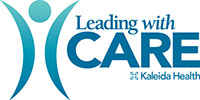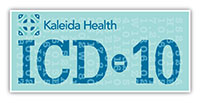
Below are the June Medical Staff Updates. As a reminder, all providers must complete the attestation at the bottom of this page by June 30.
Medical Leadership Message

Kaleida Health continues to be a healthcare leader Western New York. This year, we received confirmation of our outstanding cardiothoracic surgery, stroke, endovascular and orthopedics programs. As the next step, expansion is underway for several service lines, including neonatology and gastrointestinal diseases. We are also happy to welcome the new physicians joining our medical staff – local providers who are returning to practice at Kaleida Health and the new members joining us from around the country.
Moving forward, our focus is on our patients and their experiences at Kaleida Health. We are committing to putting patients first; every patient, every time. This includes a renewed focus on utilization management and using a new data management program to provide physicians with an easy-to-read, concise and comprehensive “scorecard.”
The new scorecard will more effectively help physicians see how they compare with their peers across the country in providing patient care. The scorecard, which was sent to physicians via their Kaleida Health email accounts, includes information on utilization, quality and Hospital Consumer Assessment of Healthcare Providers and Systems (HCAHPS) scores. Pediatric Health Information System (PHIS) specific data for comparison will be available soon.
Data that appears on the scorecard is compared to the cohort in Crimson against that of your Kaleida Health physician peers. A score highlighted in red means the standard deviation is above that of the physician’s peers and may demonstrate an opportunity.
Utilization teams are available to meet with any physician to review their data. The straightforward scorecards have been able to accurately identify areas of opportunities for our physicians and service lines throughout the organization.
If you have any questions or comments, please contact your site chief medical officer. We look forward to working with all of our provider partners as we advance health care in Western New York.
David Hughes, MD, MPH
Chief Medical Officer
Kaleida Health
Colin McMahon, MD
Chief Medical Officer
Buffalo General Medical Center
David Pierce, MD, FACEP
Chief Medical Officer
Millard Fillmore Suburban Hospital and DeGraff Memorial Hospital
Stephen Turkovich, MD
Chief Medical Officer
Women & Children’s Hospital of Buffalo
Kamil Alpsan, MD
Site Medical Director
DeGraff Memorial Hospital
Reflections from the President of the Medical/Dental Staff
 I had the opportunity to enjoy a beautiful Memorial Day weekend, like many of you did. And while Memorial Day marks the unofficial beginning of summer, the true purpose of the holiday—to remember the men and women who died in service of the US military—is often forgotten. However, it is important that we honor all American service members who have paid the ultimate sacrifice while serving our country.
I had the opportunity to enjoy a beautiful Memorial Day weekend, like many of you did. And while Memorial Day marks the unofficial beginning of summer, the true purpose of the holiday—to remember the men and women who died in service of the US military—is often forgotten. However, it is important that we honor all American service members who have paid the ultimate sacrifice while serving our country.
Reflecting on the concepts of service and sacrifice in connection with Memorial Day, consider how each of us might serve and sacrifice more in our daily work. The members of our medical staff are dedicated professionals, who forgo time with friends and family in order to provide excellent care to patients. While this routine form of sacrifice is insignificant compared to those made by the service members we honor on Memorial Day, it is worthy of acknowledgement.
The result of our hard work and modest sacrifices strengthens our medical staff and hospital, allowing us to fulfill the mission of our institution: To advance the health of our community. As we continue our pursuit of improving care in our community, I ask each member of the medical staff to reflect on the commitment of prior generations who served on our medical staff and build upon their legacy by offering constructive criticism about how we can build for the future and fulfill our mission.
The medical staff is a powerful engine for change. It is imperative that the medical staff be proactive in effecting change to benefit all of the providers. Please consider how we can assist Kaleida Health to reach its full potential.
Leading with CARE Update
We have officially launched the “Leading with CARE” educational sessions for physicians and advanced practice providers.
 This organizational imperative is structured to help you understand the mission, vision and core values of Kaleida Health. Just as important, it is designed to improve patient satisfaction, employee and physician engagement, as well as enhance the quality of care that we provide for our patients.
This organizational imperative is structured to help you understand the mission, vision and core values of Kaleida Health. Just as important, it is designed to improve patient satisfaction, employee and physician engagement, as well as enhance the quality of care that we provide for our patients.
Why is this necessary? Because we must continue to make the patient the center of all we do. We must lead from the bedside and we must Lead with CARE.
Leading with CARE will be provided to all medical students, residents, advanced practice providers and physicians. The venue for these sessions will include medical staff meetings, department meetings, grand rounds and more. We will also host a few community-based and off hour presentations to alleviate scheduling and travel issues.
It is important to note that over 9,000 Kaleida Health employees have completed Leading with CARE in the 60 days since it was launched. It is our hope and expectation that you will join us in this journey. By taking an hour out of your schedule to attend a session, you are making a commitment to improve, and achieve our goal of providing a perfect patient experience every day.
David Hughes, MD, MPH
Chief Medical Officer
Kaleida Health
AmeriMed Survey Results
Kaleida Health engaged AmeriMed Consulting to complete a medical staff development plan assessing the current supply of physicians in the region and the current and future need for physician services. The study, conducted every few years to meet Federal requirements, includes demographic and statistical research in addition to qualitative input from medical staff and community members. The results are used to support private practice recruitment and strategic service line planning.
Examination of the eight counties in Kaleida Health’s primary service area showed unique demographic challenges that differ from other similarly-sized medical communities including an older-than-average population and lower household incomes despite high educational attainment levels. The flat population trend over the last decade is projected to continue resulting in little overall growth. Despite this, the senior market is rapidly aging with a five year projected growth of 23 percent for ages 65-74. This, AmeriMed concluded, will fuel increased demand for ambulatory services across service lines.
Surveyed community members reported overall satisfaction with their physician services, and 94 percent of respondents have a primary care physician. However, 20 percent are not satisfied with their access to primary care due to the overall quantity of providers in the community as well as location, convenience, and practice hours available to consumers. This is important feedback when considering how to position new physicians to best meet patient demand. Consumers also report a high degree of willingness (77 percent) to see a midlevel provider for routine care.
Physicians shared many common concerns, including ideas about future academic affiliation, potential overlaps in services in a competitive environment, opportunities collaboration due to changing practice dynamics, and a desire to continue to collaborate positively with administration and across groups.
The AmeriMed study concluded that the Kaleida Health medical staff and the Buffalo medical community is fairly well-represented by physicians at the current time. They identified some gaps in specific specialties for a total deficiency of only 40 providers across the entire market. The larger concern is an aging medical community. Forty-one percent of the current medical staff is over the age of 55 (for a total of 480 Kaleida Health-associated FTEs), and thus it is important for service lines to access the full physician component to engage emerging leaders and plan for continuity of services to both the communities and hospitals for the years to come.
ICD-10 Begins October 1
On October 1, 2015, the current ICD-9 code sets used by healthcare providers across the country to report diagnoses and procedures will be replaced with the new ICD-10 code sets. ICD-10 allows for greater coding accuracy and specificity, as well as higher quality information for measuring healthcare service quality, safety, and security.
 The new ICD-10 system reflects advances in medicine and uses current medical terminology. It is designed to be more flexible for expansion to include advances in technology and new diagnoses. ICD-10 structure has seven characters, allowing for disease etiology, anatomic site and severity.
The new ICD-10 system reflects advances in medicine and uses current medical terminology. It is designed to be more flexible for expansion to include advances in technology and new diagnoses. ICD-10 structure has seven characters, allowing for disease etiology, anatomic site and severity.
The current ICD-9 coding structure is 30 years old, has outdated terms, and is inconsistent with current medical practice. The structure of ICD-9 limits the number of new codes that can be created and many categories are full. ICD-9 also lacks the specificity of information conveyed in the codes.
There are 13,000 diagnosis codes and 3,000 procedure codes in ICD-9 compared to 68,000 diagnosis codes and 87,000 procedure codes in ICD-10. Due to the increased number of codes, the change in the design of each code, and increased code specificity, this transition will require significant planning and training with support from personnel across all of Kaleida Health.
Everyone covered by HIPAA will be affected by this change, including providers, payors and vendors. After the conversion on October 1, claims for all services must use ICD-10 diagnoses codes, and inpatient claims after October 1 must use ICD-10 procedure codes.
Service line-specific ICD-10 educational modules will be offered for providers in the next several months.
Reducing Blood Culture Contaminants
Blood culture contamination has a significant effect on quality of patient care and patient satisfaction, but also on resource utilization. Blood culture contaminants are associated with unnecessary treatment, increased length of stay, total charges, pharmacy charges and laboratory charges. These incidents also negatively impact our publicly reported central line associated bloodstream infection (CLABSI) rates.
The 2015 goal is to reduce blood culture contamination rates from the 2014 baseline of 2.66 percent to a year-end average of 1.5 percent, which presents an opportunity to improve quality of care, nursing practice, patient satisfaction, decrease length of stay, and to show financial stewardship.
Follow these best practices to reduce blood culture contaminants:
- Blood cultures should be drawn via peripheral venipuncture whenever possible (For special patient populations, consider discussing with a specialist to determine the most appropriate draw source)
- Ordering line draw blood cultures should be the exception to the rule
- For adult populations, peripheral IV draws, especially at the time of IV insertion, are associated with contamination rates that are higher than direct peripheral venipuncture and are no longer approved per adult policy TX.44
- “Surveillance” blood cultures should not be done; blood cultures should only be ordered when there is evidence of infection
Additional evidence-based guidance is available at http://cid.oxfordjournals.org/content/49/1/1.full.
Upcoming Lecture
 24th Annual Dr. George A. Cohn Memorial Lectureship
24th Annual Dr. George A. Cohn Memorial Lectureship
Thursday, June 11, 2015
3 p.m.
Gates Vascular Institute
Conference room 5019
875 Ellicott Street
Buffalo, NY 14203
Guest speaker, A. Leland Albright, MD, clinical adjunct professor of Neurosurgery, University of Wisconsin Health Center, will reflect on developing pediatric neurosurgery in developing countries.
Chiefs of Service Reports
Psychology – Submitted by Beth Smith, MD
Kaleida Health’s medical staff has 30 psychiatrists – nine of which with subspecialty training in child and adolescent psychiatry – and seven therapists with a PhD in psychology. The provision of psychiatric services within Kaleida Health focuses on consultation liaison psychiatry services at all four hospitals and HighPointe on Michigan, outpatient pediatric psychiatry services, and collaborative care initiatives within Kaleida Health’s primary and specialty clinics.
The UB Department of Psychiatry faculty doctors care for patients at Kaleida Health sites, and train 27 general psychiatry residents and six child psychiatry fellows. UBMD Psychiatry maintains scholarly productivity, including 127 publications, 100 presentations and grant funding exceeded $12 million in 2014.
The department’s faculty has internationally-recognized research in mood disorders, schizophrenia, addictions and medical informatics. Additionally, the Department of Psychiatry has significant research efforts on mental healthcare delivery supporting medical home and DSRIP initiatives within Kaleida Health, including:
- The Access to Psychiatry through Intermediate Care Project focusing on diversion from emergency and inpatient services
- Child and Adolescent Psychiatry for Primary Care (CAP-PC), the second largest child psychiatry access program in the nation
- The Depression Screening and Treatment Project at Women & Children’s Hospital of Buffalo Lung and Cystic Fibrosis (CF) Center, which is being adapted by CF Foundation accredited centers across the United States
- Provision of psychiatric supervision and treatment to Erie County’s family court and juvenile justice system
- Integrated Care for Kids initiative provides therapy, psychiatric services and care coordination in two pediatric practices
Aging Providers Policy Update
Kaleida Health’s Medical Executive Committee recently reviewed and updated Kaleida Health Policy MED.19, “The Aging Provider Policy,” to ensure continuity of the aging provider assessment process.
The Credentials Committee reviews the capabilities, competencies and health status of each provider at the time of medical staff reappointment. At the age of 70, providers are required to undergo an independent medical examination (IME) that addresses the physical and neurological capacity for the privileges requested. At the age of 75, providers will undergo the IME annually.
See the full policy for more details.
Policy Updates for Providers
Below are the new and revised policies and standards of practice that affect providers at Kaleida Health. Please take a moment to review this month’s updates. The policy links below are accessible from a Kaleida Health computer only. For additional assistance, please contact Amy Palombo at apalombo@kaleidahealth.org or 716-859-8447.
New Policies:
CL.10 – Do-Not-Resuscitate Orders in the Operating Room
CL.51 – Troponin Critical Value Call Back
Revised Policies:
MED.19 – The Aging Provider Policy – Policy was revised to clarify the entire process. Also, information was added to define a process for immediate and serious concerns.
Medical Staff Attestation - June 2015
By submitting this attestation, I confirm that as a member of the medical staff I have read and understand the information included in this email from Kaleida Health.
| Fields marked with an asterisk (*) are required. |